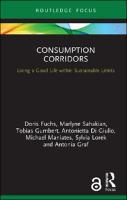Consumption Corridors
Living a Good Life within Sustainable Limits
Author(s)
Fuchs, Doris
Sahakian, Marlyne
Gumbert, Tobias
Di Giulio, Antonietta
Maniates, Michael
Lorek, Sylvia
Graf, Antonia
Language
EnglishAbstract
Consumption Corridors: Living a Good Life within Sustainable Limits explores how to enhance peoples’ chances to live a good life in a world of ecological and social limits. Rejecting familiar recitations of problems of ecological decline and planetary boundaries, this compact book instead offers a spirited explication of what everyone desires: a good life. Fundamental concepts of the good life are explained and explored, as are forces that threaten the good life for all. The remedy, says the book’s seven international authors, lies with the concept of consumption corridors, enabled by mechanisms of citizen engagement and deliberative democracy. Across five concise chapters, readers are invited into conversation about how wellbeing can be enriched by social change that joins "needs satisfaction" with consumerist restraint, social justice, and environmental sustainability. In this endeavour, lower limits of consumption that ensure minimal needs satisfaction for all are important, and enjoy ample precedent. But upper limits to consumption, argue the authors, are equally essential, and attainable, especially in those domains where limits enhance rather than undermine essential freedoms. This book will be of great interest to students and scholars in the social sciences and humanities, and environmental and sustainability studies, as well as to community activists and the general public.
Keywords
Consumption Corridors; consumerism; planetary boundaries; Sustainable consumption; social justice; wellbeingDOI
10.4324/9780367748746Publication date and place
2021Imprint
RoutledgeSeries
Routledge Focus on Environment and Sustainability,Classification
Environmental economics
Ethics and moral philosophy


 Download
Download